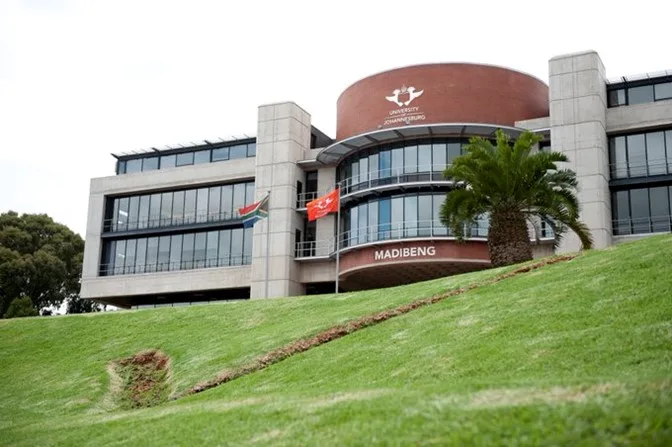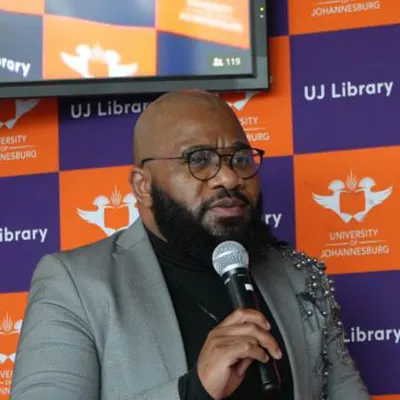Realigning digital library resources with institutional goals
July 30, 2025
By Susan Jenkins

Two librarians explain how the University of Johannesburg’s Library and Information Centre transformed access to essential resources and earned the library recognition for contributing to the university’s strategic goals
A new vision to support open science publishing
As the lead librarian for Collection Development, Faith Zalekile and her team were facing a conundrum–how to cover more open access publishing APCs (article publishing charges) for their researchers, which was important to the university’s strategic goals. “The university is funded through its research output, and a lot of emphasis is placed on open science publishing to meet sustainable development goals (SDGs) and build global stature for the university.”
Initially 10% of their information budget was allocated for APCs, but this had grown to 30% in a few short years, impacting what they could allocate to renewals and new acquisitions. “It highlighted the need to do something strategic. The library decided to jump in and see how we could make it happen.”
Another factor in the mix was a growing reliance on non-traditional information sources. Faith was receiving requests to purchase digital tools for both research and teaching, such as anatomy databases where lecturers can interact with and assess their students or databases for systematic reviews. “It all points to the shift of what academics, and as a result, our students need; the format of what we purchase is no longer just print, ebooks, or article databases.”
This project was a very big eye opener that allowed us to evaluate our collections and identify what was really serving our academics and students.
Faith Zalekile
Team Leader for Collection Development at University of Johannesburg Library
The library took on the challenge with a special task team in early 2024, and the “sustainable collection development project” was born: a plan to re-imagine how the library could meet these needs without needing an increase in existing budgetary resources.
4 criteria for assessing the value of renewals
To coincide with renewal timelines on their subscriptions, Faith and her team had only five months to plan and execute the new strategy. Their approach was to develop a set of criteria for evaluating renewals that would help them reallocate their resources with buy-in from faculty. These criteria arose from recognizing that over the years, the renewals process had become too routine. “You could almost sense in faculty responses that people didn’t really interrogate the list to see what they wanted to retain or cancel.”
Faith notes the project engaged faculty involvement with a clear message: “We will give you the renewals list and enough information to make informed decisions – because we definitely have to cancel some subscriptions.” Then they annotated the renewals list for each area with that information: statistics aimed at understanding collection value and raising awareness of the opportunities APC coverage could bring:
1. Usage data for everything
The team knew that showing actual usage statistics would be a strong support for evidence-based decision making. The team collected statistics for all their databases, even those which do not use COUNTER metrics. They also contacted publishers for their one-off journal subscriptions, since those usage statistics are not reported.
2. Sharing the impact factors of APC-supported journals where their researchers had published
By showing these examples, the team wanted to encourage their authors to consider the value of a journal’s reach, not only availability of APC publishing support.
3. Highlighting journals included in their transformative read & publish agreements
This information was included to create more awareness of these agreements and the possibility for their authors to leverage them. They also included the impact factors of these journals to highlight their value and indicated how many UJ authors were already publishing in them.
4. Costs per search for databases or individual journals
The team was able to calculate and show these costs for each database they subscribed to as well as for searches in one-off journals not part of a larger package.
A final part of their strategy was communication. Faith notes, “last year, when I approached, everyone knew I wouldn’t talk about anything except the ‘sustainable collection development project.”
Their strategy worked. One surprising outcome was the discovery that journals previously considered “core” to a specific subject area were no longer the most valued by faculty. Indeed, statistics showed that in some instances, usage was non-existent. Faith explains, “This project was a very big eye opener that allowed us to evaluate our collections and identify what was really serving our academics and students.”
Impressive impact on the university’s goals
With their analysis and faculty responses, they were able to cancel about 9 million rand (5.8% of their total information budget and 10.4% of the subscriptions budget). University administrators were impressed with the deft resource juggling and identified the library as “having put the means in place to work towards achieving their sustainable development goals.” As a result of this, Faith notes another positive outcome: “The university’s Executive Leadership Group offered an additional 4 million rand for us to use as top-up on our APCs budget.” Faculty are also happy with the additional support they can count on from the library. Reflecting on the outcomes and challenges, Faith says, “it wasn’t a light project, but it showed our resilience and that if you pull together as a team, you can actually achieve things."

Empowering campus-wide digital and AI literacy
As on campuses everywhere, UJ has noted the growing use of digital technology for research and study, particularly AI. Nkhenso Sibuyi notes, “we have to put systems in place now to ensure academic integrity is upheld. If we wait for policy, it’ll be too late.”
Nkhenso was hired in March 2024 to be the library’s first Digital Scholarship specialist, bringing a background in informatics and diverse experience implementing digital information systems. When Nkhenso arrived on campus, he found only one digital research tool supported by the university, and minimal guidance on the effective and transparent use of AI-enhanced applications. “I was starting from scratch,” he says. It’s clear he hit the ground running, designing and launching the library’s Digital Scholarship Sphere (DSS) in six months. Since September of 2024, the DSS is the university’s central resource hub for evaluating, training, and supporting researchers and students in using digital tools for research and study.
Through a dedicated webpage, UJ students, researchers and staff can connect to a curated collection of research tools such as Scopus AI, data analysis and visualization tools, and writing-assistance tools designed for academic users. Nkhenso highlighted four priorities for the DSS that are helping it integrate with the needs of librarians, faculty, and students alike.
1. Building digital capacity and digital literacy
The top goal of this initiative is to close knowledge gaps between library staff and users. Through DSS, the library can organize one-on-one consultations for faculty or graduate student researchers with either Nkhenso or a member of his team of appointed tutors, whom each hold at least a master’s degree. There are also scheduled and tailored workshops to train users and staff on the skills needed to use the applications effectively.
2. Reframing the library as a university innovation partner
By collaborating with faculty librarians, academic staff and other support professionals on digital frameworks for teaching and research design, the DSS is helping the library be seen as “more than just a service provider, but also as an innovation partner” explains Nkhenso. The DSS is part of the library’s research support, teaching and learning area, which is responsible for implementing digital transformations in those university activities. This vision has been made possible through strong leadership support. “Nomoya Mahlangu, Director of Research Support, Teaching and Learning, gave me the space to build this vision from the ground up,” he says. “And our Executive Director, Maria Frahm-Arp, has been instrumental in positioning the library as a university-wide driver of ethical integration of digital tools and methodologies in research and innovation."
You can’t talk about AI without human intelligence, so through this declaration, they have to report how they provided a human contribution as well.
Dr. Nkhenso Sibuyi
Manager of Digital Scholarship for Research Support, Teaching and Learning at University of Johannesburg Library and Information Centre
3. Teach the ethical use of digital scholarship tools and support research integrity.
Nkhenso notes, “whenever I’m training on AI, I always use the keyword ‘ethical integration.” He helped the library become the go-to resource for these principles early on by redesigning the university’s declaration form for students and researchers to report their use of AI-enhanced tools. “You can’t talk about AI without human intelligence, so through this declaration, they have to report how they provided a human contribution as well.”
This mission was initially met with some resistance from academics, Nkhenso adds. “But then I tell them about a survey here showing that over half of the students in the university are already using and/or exposed to AI in one way or another. An analogy we have is to say ‘it’s like when you have a teenager, you choose whether you want them to learn from the street or to learn from home.’ Our approach is we will teach them from home.”
4. Teach research skills using digital AI tools
About 70% of the DSS consultations are with Masters and Doctoral students and post-doc researchers to help them build skills in digital methodologies. An example is learning to use Scopus AI for literature reviews. Nkhenso explains, “let’s say you’re researching Ubuntu, South African philosophy. Supervisors will say, ‘you can’t talk about Ubuntu without citing so-and-so.’ Now AI has made it easier by showing you which researchers are publishing in this area, so you don’t miss the core.”
The DSS’s centralized expertise also means that whenever AI features become available for the library’s databases or a particular faculty’s research tool, Nkhenso is brought in “to ask the right questions.” The DSS collects trial data so if a new tool or feature is acquired, he and his tutors are ready to support it.
A higher profile across campus
Usage of the various tools in the DSS portfolio has grown steadily since the launch – an early indication that the DSS is making an impact. This growth has been supported by early investment. “We were fortunate to receive a catalytic budget to help procure most of these tools early on,” he notes. “It made a real difference in showing that this work matters; and in helping us pilot things that would’ve taken years otherwise.” Nkhenso is looking forward to measuring the data from the first full year of operations at the end of the exam period in December, when the DSS’s influence on research and learning capacities at UJ will be clearer.
Awareness of Nkhenso’s efforts behind the DSS has been helped by what he referred to as “a great marketing team.” The DSS is promoted with flyers on library elevators as well as through the library’s popular social media account, email announcements, and of course the library website. “The library has a great following on social media,” he added. “I think it’s bigger than for the university itself.”
About our featured librarians:
Faith Zalekile is Team Leader for Collection Development at the University of Johannesburg Library. Faith holds a National Diploma in Banking (Technikon Witwatersrand), National Diploma in Information Science (UNISA), a Certificate in Project Management (University of Johannesburg), Generic Management Certificate (University of Johannesburg) and Bachelor of Information Science (UNISA).
Faith’s journey in the library world began in 2005 at the University of Johannesburg, with a Financial qualification obtained at Technikon Witwatersrand. She started out at the circulation desk as the reserve collection assistant, and after three weeks moved to the periodicals and Acquisitions section. In late 2009 she was appointed Team Leader Acquisitions & E resources. Since then, she has obtained an Information Science qualification and is furthering her studies in this field. Currently she is the Team Leader for Collection Development, Access & Discovery UJ.

Dr. Nkhenso Sibuyi is Manager of Digital Scholarship for Research Support, Teaching and Learning at the University of Johannesburg Library and Information Centre. He holds a Doctor of Technology (DTech) degree in Informatics from the Cape Peninsula University of Technology, with extensive experience in digital innovation across diverse sectors; including healthcare, higher education, and business.

About the University of Johannesburg:
The University of Johannesburg, celebrating its 20-year anniversary in 2025, was established in 2005 following a landmark merger between the Rand Afrikaans University, the Technikon Witwatersrand, and the Vista University Soweto Campus. Since its inception, UJ has grown into a dynamic, multicultural, and inclusive institution with a student body of over 50,000, including over 12,000 postgraduate students and more than 3,000 international students from over 80 countries. As one of the largest contact universities in South Africa, UJ plays a leading role in the country’s higher education landscape.
If it wasn’t for my librarian...
I’d have flunked my first year. From lending an ear to offering words of advice, we’ve heard so many stories about how librarians have supported students in overcoming academic challenges.
To the librarians of the world, thank you.

Contributor
